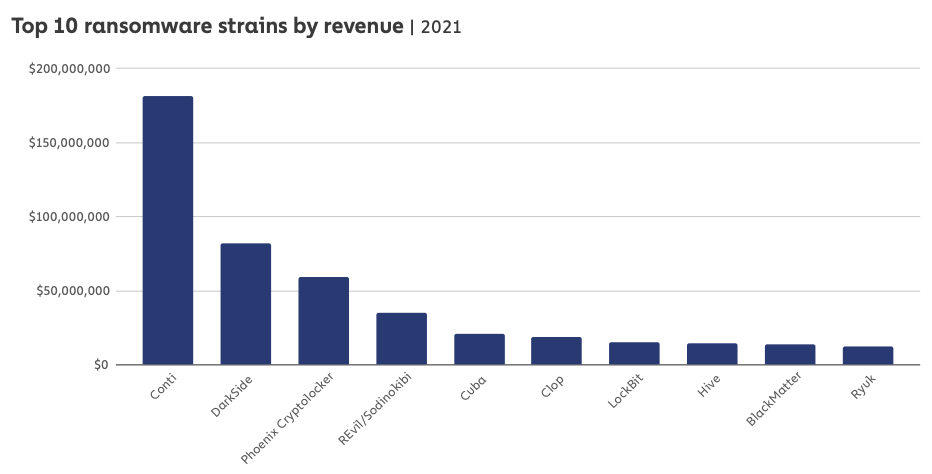Monthly Linkspost 3/2022
post by Keller · 2022-04-02T23:57:29.228Z · LW · GW · 3 commentsContents
Offense and Defense Growth Good and Evil Data Time! Fluff None 3 comments
This is a linkspost for https://keller.substack.com/p/monthly-shorts-322
Offense and Defense
So, we talk about ransomware as this serious and emerging problem. But it’s interesting to see that part of why ransomware is hard to solve is that it’s incredibly easy. Here are the top criminal groups by ransomware revenue.
 The top one, Conti, is a clear market leader
The top one, Conti, is a clear market leader
How much does Conti pay their staff? New people make $1-2k. Monthly. These can’t be the best people in the world: Google has a Moscow office, to pick but one example. And Conti is protected by the Russian government! They don’t have to worry (much) about being arrested! “Just don’t work for people doing bad things” is actually really enough for most people. The issue is that the imbalance between offense and defense in cyber is really severe.
This Vanity Fair article matches my current state of mind on lab leak vs natural origin: the biological evidence seems to point mildly towards natural origin, and the political observation is that the Chinese central government, the Wuhan Institute of Virology, and a number of US scientists have frantically worked to cover it up. Which, of course, leaves the obvious implication that they’re guilty: how likely would this behavior be if they knew that it was natural origin? Oh, and also, whether or not SARS-CoV-2 was a lab-escape, we should still stop gain of function research with our existing, inadequately secure, labs.
If you want to do something about Russian censorship (which directly contributes to the viability of the war), I can recommend Snowflake, which makes being a place that Tor traffic comes from much easier. It makes Tor safer for those who use it, it makes your own traffic marginally more anonymous (because anything could plausibly be Tor traffic instead), and is very simple to run: you literally just keep the tab open.
You may have read about the Modern System, as Brett Deveraux calls it following Biddle, where young officers are given a clear understanding of the “commander’s intent”, something that you can reasonably call a goal, and an order to get the job done. It relies on flexibility, leadership, and competence in your officer corp. The US is very good at it. One of the reasons many other countries don’t like it is that it tends to produce good revolutionary leaders.
Modern authoritarian ‘coup-proofing’ makes it practically impossible to actually implement the modern system effectively (which is part of why most tin-pot dictators produce such poor military performance; though note that not all authoritarian regimes need to coup-proof in this way).
Which is probably part of why at least 8 US-trained officers have overthrown their governments in Africa alone, without US backing. The relevant Department of Defense command does not track data on the point, though it seems a rather important outcome measure from my perspective. But, of course, tracking outcomes rather than inputs is always dangerous: you’re liable to find that your training does nothing.
New Zealand suffered a 58% casualty rate of all volunteer fighters during WWI. That fact comes from Page 30 of the Wikibook on New Zealand History, which is mostly not very good, but some of the others are better. Here’s Sociology! Here’s Signals and Systems, leading into Control Theory. Or maybe you want the Fundamentals of Transportation? All free and remixable.
Let’s give German industry a round of applause! After a very long recovery period, they have managed to displace the United Kingdom, and in doing so become the only state that isn’t a permanent member of the UN Security Council to be in the top five global arms exporters! Other fun details
The majority of Chinese arms exports are to India’s neighbors. No points for guessing why.
The US’ biggest export target is Saudi Arabia. You might remember them from other highlights like being the homeland and training location of the majority of the 9/11 attackers, doing absolutely nothing about the Russian invasion of Ukraine, and having a truly terrible record on women’s rights.
There are many types of defense.
 I dislike the post this image comes from, mostly because I think it’s a little lazy in grouping ideological enemies together and ignoring important differences. But it’s a great image, and there’s interesting commentary on social movement strategies. If you don’t recognize what this I can strongly recommend Vaclav Havel’s Power of the Powerless.
I dislike the post this image comes from, mostly because I think it’s a little lazy in grouping ideological enemies together and ignoring important differences. But it’s a great image, and there’s interesting commentary on social movement strategies. If you don’t recognize what this I can strongly recommend Vaclav Havel’s Power of the Powerless.
Foreign Exchange does an excellent daily global news roundup, if you’re a recovering junkie like myself, and they also have the occasional commentary piece. This one is a fascinating work on party politics and institutionalization, particularly worthwhile for understanding it methodologically.
Growth
Neat piece making the case for agricultural productivity, in a very different intellectual framework from your traditional Progress Studies pieces.
Fascinating paper on how coding languages evolve.
America’s decline in immigration has contributed to a falling rate of Nobel prize accumulation.
The CSET Map of Science is really cool!

Good and Evil
Apparently, ethicists aren’t very good at it. They steal more books than other philosophers!
This piece, courtesy of Aella, is quite good. It’s easy for people to think of themselves as good people, and so they don’t check to see if they might be doing harm. It’s not a good fact about humans.
You may remember Columbia’s, shall we say, ethically questionable administration, from previous incidents like their harmful masters programs in extremely poorly paid fields that inadequately disclose their results1. But I had not previously been aware that they were engaged in truly impressive data fraud to juice their US News and World Report rankings. Columbia has risen from 18th place to 2nd, over the course of a mere two decades, substantially via what I believe is traditionally referred to as “creative accounting”.
Interesting example of moral harm: working on developing the atomic bomb without anyone being willing to tell you what you were actually making.
A fascinating Trumpist article on Ukraine blames the US for encouraging Ukraine to seek NATO membership without properly guaranteeing to defend it with use of force. Realists like Mearsheimer will say “when push comes to shove, strategic considerations overwhelm moral considerations”. But this one is interesting for attempting to make a moral case without really grappling with the question, at any point, “do the Ukranians want a non-corrupt democracy?”
Data Time!
Here’s Applied Divinity Studies and Bryan Caplan on why it makes sense to trust someone more if they publish their data, even if almost nobody ever checks.
Manifold is very kindly showing us their analytics dashboard!
Rather than change Excel, we just changed the names of genes to stop getting Excel errors.
MIT is bringing back SAT/ACT, and cites a great deal of research as to why.
These polling results give a useful sense of both what neoliberalism, as something that people self-identify with, actually means in policy terms, and gives a sense of how far American voters are from it. Also, they have given us the crosstabs, and it was not *enough* because they have given us the crosstabs in a PDF but I am still thankful and they should be praised.
So, it turns out that between 20 and 40% of brides were pregnant in the 16th, 17th, and 18th centuries in England.
About three million Americans have a security clearance, according to a fun little report that also contains information like how long it takes to get clearance.
This is a fascinating post that, among other things, reinterprets the paper you’re likely familiar with on the positive impact on a field of an elite scientist dying. Disclaimer: I think I’m paid by the same people he is? The funding network is certainly incestuous enough.
You can now read some of the useful legal code of Georgia! They’d tried to copyright it and charge money for access.
Fluff
I’ve recced Graham Factor before, and this essay is a good instance of what I get out of it. So much of the anti-cop messaging I see as someone in left-libertarian circles emphasizes individual accounts, particularly of the corruption and apathy of the NYPD and the SFPD. The SFPD did bomb and shoot service weapons to get their way in a contract dispute, and now seems useless to help my friends when they could be helpful. NYPD have different cards for different types of institutionalized corruption, social and personal, and borderline hostility to the lives of cyclists. But there are over 10,000 police departments in America, and if you’re going to read one side’s anecdotes, I think you should at least try to balance that.
Fun post on love languages in dance I got from Logan Strohl on FB. I once asked a friend how she would do the love languages work better, given the terrible methodology of the original. She flipped the question on me, and asked me to first understand what people got out of the original, and then figure out how to better provide that.
Request for comments: When it comes to bad institutions, the standard policy options are starve, fund, reform, and compete.
Starve: The police are bad, so we should give them less funding. Schools don’t teach anything, so we should give them less money. The TSA has literally never stopped an actual terrorist with their searches, so we should give them less money and authority.
Fund: Teachers are great and schools are great (even if almost no learning sticks; even if most of the value of education is signalling; even if it’s routine, years and decades after, for people to have nightmares about being back in school; even if schools typically open in ways that leave teenagers with chronic sleep deprivation and all the symptoms you expect of it), so we should fund them more.
Reform: The new boss has arrived, and she’s here to shake things up. The tax code is bad, so we’re going to rewrite it.
Compete: We’re just not thrilled with how the Air Force is handling space, so while they’re probably still going to do some space, we’re starting up a new Space Force: if it can do well on its own, great. If it can’t, well. Funding will be allocated accordingly. This is also private schools, the Marines, and the vast majority of economic output (particularly in sectors where failure in provision is tolerable).
What does this miss, and why is it an inadequate framework?
I have nothing against an MFA as an MRS degree. Yes, traditionally that was for undergrad, but as an ex of mine pointed out, in the modern era everything’s been bumped a level of degree. Though at the moment I’m a toiling grad student and she’s a CEO who may or may not own her own island, so take that advice as you will.
3 comments
Comments sorted by top scores.
comment by jefftk (jkaufman) · 2022-04-03T17:20:47.863Z · LW(p) · GW(p)
Google has a Moscow office, to pick but one example
Pretty sure there are no Google engineering offices in Russia anymore, and haven't been for several years: https://www.theguardian.com/world/2014/dec/12/google-closes-engineering-office-russia
comment by gwern · 2022-04-03T00:57:05.491Z · LW(p) · GW(p)
Which is probably part of why at least 8 US-trained officers have overthrown their governments in Africa alone, without US backing. The relevant Department of Defense command does not track data on the point, though it seems a rather important outcome measure from my perspective. But, of course, tracking outcomes rather than inputs is always dangerous: you’re liable to find that your training does nothing.
My instant reaction is to wonder about the denominator: the US loves to provide training because the marginal cost is low when you're doing so much training already, and it's harder to criticize than providing fighter jets etc. Maybe this is what you would expect from all the training aid the US provides in its various packages. (It sounds like they don't and can't know either, but you could at least try to guess from # of countries given aid / # of coups.)
Apparently, ethicists aren’t very good at it. They steal more books than other philosophers!
comment by TLW · 2022-04-03T02:23:30.763Z · LW(p) · GW(p)
And Conti is protected by the Russian government! They don’t have to worry (much) about being arrested! “Just don’t work for people doing bad things” is actually really enough for most people.
Alternatively: people who are good at cybersecurity typically don't trust the Russian government, or don't want to live in Russia.
